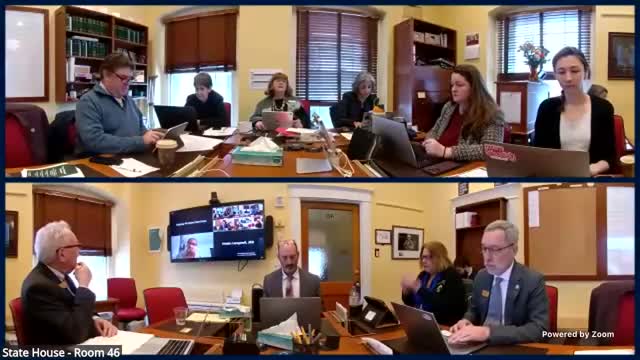Joint Fiscal Office, AHS give committee a Medicaid 101 and outline Vermont's 1115 'Global Commitment authority
Get AI-powered insights, summaries, and transcripts
Subscribe
Summary
The Joint Fiscal Office and Agency of Human Services briefed the House Human Services Committee on Medicaid basics, federal matching (FMAP), and Vermont's 1115 Global Commitment waiver, emphasizing the program's scale, optional vs. mandatory benefits, and flexibility afforded by investments and waiver-only authorities.
The Joint Fiscal Office and Agency of Human Services on Wednesday gave the House Human Services Committee a high-level briefing on Medicaid coverage, finance and Vermont's use of an 11-15 (1115) waiver known as Global Commitment.
Nolan Langwell, fiscal analyst with the Joint Fiscal Office, told the committee, "Medicaid is very, very complicated," and outlined enrollment, spending and the federal-state match formula that pays for the program. Ashley Berliner of the Agency of Human Services described how Vermont's 1115 waiver funds services not otherwise matchable under federal law and creates flexibility for the state's Medicaid operations.
The presentation focused on why Medicaid matters to Vermont: about 197,000 Vermonters receive some form of Medicaid or CHIP assistance; roughly 151,000 people (about 23 percent of the state) have Medicaid as their primary coverage and another roughly 46,000 receive partial assistance such as exchange subsidies, the speakers said. Langwell warned that some of the data sources used in the slides are lagged, and that newer household-survey and expenditure-analysis numbers will appear in coming months.
Why it matters: Medicaid accounts for a large share of state health spending and the state budget. Langwell said Medicaid accounted for roughly 27 percent of Vermont's state budget in fiscal 2024 and about a quarter of health-care spending overall. Changes in the federal matching rate would therefore have immediate budget consequences for the state.
Key details from the briefing: - Federal match (FMAP): Langwell explained that the federal medical assistance percentage is calculated from multiyear income comparisons and varies by state; Vermont's regular FMAP is about 58.8 percent federal to 41.2 percent state. "For every $1 we spend on Medicaid, we get a dollar 43 in federal match for a gross total of $2.43," he said, characterizing the leverage that federal dollars give the state. He noted other FMAPs exist for CHIP and for the Medicaid expansion "new adult" group. - Medicaid expansion/new adult group: Ashley Berliner and staff described the post-ACA expansion group (commonly called the new adult group) that provides coverage to low-income adults who are not categorically eligible under older rules. Vermont receives a 90:10 federal match for the expansion population; the speakers said about 41,000 people currently receive that match in Vermont. - Mandatory vs. optional services: Berliner reviewed that certain benefits are mandatory under federal law and others are optional, and she stressed that many long-term supports (personal care, many developmental-disability residential services) are treated as optional federal benefits even though most states cover them. Vermont has adopted nearly all optional services and provides a broad benefit package through its program. - 1115 Global Commitment waiver: Berliner described Vermont's long-running 1115 authority (in place since 2005, most recently renewed in 2022 and amended this month) that permits the state to obtain federal match for programs and payment approaches that would otherwise be outside traditional Medicaid rules. The waiver must remain budget neutral to the federal government and gives Vermont two major advantages: (1) it allows federal match for "waiver-only" services (examples the presenters listed included marketplace premium assistance, enhanced pharmacy wraparound benefits, pay-for-institutions-of-mental-disease stays at Brattleboro Retreat and the Vermont Psychiatric Care Hospital, and the new permanent supportive housing benefit); and (2) it permits the Department of Vermont Health Access to operate with managed-care-like flexibility (value-based payments, participation in all-payer models, and investment authority). - Investments and caps: Berliner said investments are a distinctive tool in Vermont's waiver model: funds that would otherwise accrue to private managed-care margins instead can be reinvested in public programs. She said roughly $120 million is being spent on roughly 69 investments this year; those investments must meet waiver criteria, are subject to CMS approval, and now have state-side caps. - New and pending programs: The presenters said the state has authority under the waiver to launch permanent supportive housing supports (including up to six months of rent and six months of medical respite for eligible Medicaid enrollees), but implementing that authority requires state match dollars and an implementation timeline. The presenters said implementation cannot begin before January 2026 at the earliest.
Committee members asked about timing of federal and state approvals for waiver changes, data lags in expenditure reports, the population counts for expansion subsidies and exchange subsidies, and how the investment authority is evaluated. Langwell and Berliner said the state will begin negotiation and renewal work in 2026 for waiver expiration in December 2027 and that the state has contracted with the University of Chicago to evaluate investments over several years.
The presenters urged members to remember the distinction between Medicare (a federal-only program) and Medicaid (a federal-state partnership) and to account for lagged source data when citing precise enrollment or expenditure numbers.
Looking ahead: Langwell and Berliner said renewal of the 1115 waiver will be a major policy negotiation in 2026 and 2027, and that the state must identify any state match for new waiver-funded services in upcoming budgets.
Ending: The committee thanked the presenters and said they might invite the fiscal office back for additional briefings on child-care finance and other budget items.
